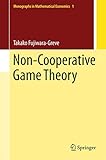Non-cooperative game theory / Takako Fujiwara-Greve.
Material type: TextSeries: Description: xi, 260 pages : illustrationsISBN:
TextSeries: Description: xi, 260 pages : illustrationsISBN: - 9784431556442 (alk. paper)
- 4431556443 (alk. paper)
- 519.3 FUJ
| Item type | Current library | Home library | Call number | Status | Date due | Barcode | |
|---|---|---|---|---|---|---|---|
 Book
Book
|
Dept. of Futures Studies Processing Center | Dept. of Futures Studies | 519.3 FUJ (Browse shelf(Opens below)) | Available | DFS4058 |
Includes bibliographical references and index.
This is a textbook for university juniors, seniors, and graduate students majoring in economics, applied mathematics, and related fields. Each chapter is structured so that a core concept of that chapter is presented with motivations, useful applications are given, and related advanced topics are discussed for future study. Many helpful exercises at various levels are provided at the end of each chapter. Therefore, this book is most suitable for readers who intend to study non-cooperative game theory rigorously for both theoretical studies and applications. Game theory consists of non-cooperative games and cooperative games. This book covers only non-cooperative games, which are major tools used in current economics and related areas. Non-cooperative game theory aims to provide a mathematical prediction of strategic choices by decision makers (players) in situations of conflicting interest. Through the logical analyses of strategic choices, we obtain a better understanding of social (economic, business) problems and possible remedies. The book contains many well-known games such as the prisoner's dilemma, chicken (hawk-dove) game, coordination game, centipede game, and Cournot, Bertrand, and Stackelberg models in oligopoly. It also covers some advanced frameworks such as repeated games with non-simultaneous moves, repeated games with overlapping generations, global games, and voluntarily separable repeated prisoner's dilemma, so that readers familiar with basic game theory can expand their knowledge. The author's own research is reflected in topics such as formulations of information and evolutionary stability, which makes this book unique. --
There are no comments on this title.

